Policy experts and resource persons are analysing Nigeria’s persistent problems with its oil and gas industry, with an emphasis on the effects of removing fuel subsidies, deregulation of the downstream sector, refinery operations, and the possible advantages of privatisation.
In a recent conversation on A Place at the Table on News Central TV, the crux was on Nigeria’s significant reliance on oil, a natural resource that has turned into a double-edged sword because of corruption and poor management.
The panellists discussed the implications for regular Nigerians who bear the cost of growing fuel prices of the government’s recent elimination of fuel subsidies, a major policy change. Nigeria’s state-owned refineries are inefficient and have a history of not meeting domestic demand, which raises serious issues.
Former Group Executive Director of Sahara Group, Tonye Cole, claims that while some people were shocked by the now-famous or infamous announcement made at Eagle Square on May 29, 2023, others viewed it as a daring declaration that things had changed.
“After all the horse-trading, nobody could be trusted.” Then came the purportedly perfect solution—a top-notch refinery that could satisfy Nigeria’s needs. But Nigeria defies even the most well-considered mathematical reasoning, and with the opening of the Dangote Refinery, the nation experienced yet another round of petroleum shortages. What exactly went wrong? Will petrol lines disappear forever, and is the subsidy gone,?” he asked.
“Not “business as usual” anymore. When the president decided to take on a monster that has tarnished every administration since Nigeria regained democracy in 1999, any scepticism regarding the seriousness of an administration in handling the complexity of a nation like Nigeria was banished. “
He suggested that the majority of Nigerians who were unhappy with the tangible benefits of democracy that had somehow escaped them would find solace in clinging to their chip well.
“The rest of the population would be satisfied with subsidies as compensation if politicians and the select few, often known as the cabal, had unfettered access to the National Cake.
“However, this sense of contentment was only superficial because every so often a sensational headline about subsidy scam would erupt, and the press would be flooded with astounding amounts of money transferred in the name of subsidies to what appeared to be the cabal’s pocket.”

On other occasions, he said, petrol shortages would appear suddenly, leading to allegations and rebuttals over who or what was at fault—was it the Central Bank of Nigeria, traders, oil marketers, the Nigerian National Petroleum Company Limited (NNPCL), etc.?
Fuel scarcity in Nigeria has always been a price issue, according to Kelvin Ayaebafie, who offered his perspective on the matter.
He alluded to the historical practice of using Nigerians as petroleum product subsidies.
“As you can see, we have lost 92% of our currency value in the last ten years, making it unfeasible to continue subsidising petrol in the budget. As a result, the government transferred the subsidy to the NNPCL to postpone the cost, and the Dangote Refinery arrived.
“There was discussion about whether or not the Petroleum Industry Act’s sections 317 7 and 8 would be followed, which state that if you have demonstrated the ability to refine and supply Nigerian markets, the regulator, NNPCL, is not supposed to grant licenses for people to import. However, the balance of power was shifted because Dangote is not downstream, and even if he has a refinery that can meet Nigeria’s fuel needs, he does not have control over the downstream market or the balance of power.”
In addition to pointing out the shortcomings of earlier attempts at privatisation, the panellists suggested that privatisation might offer a route forward, citing successful examples such as the Indorama petrochemical facility. The discussion then turns to the logistics of oil distribution, highlighting the necessity of improved planning and infrastructure to successfully meet seasonal demands, especially during peak times.
The experts urged the government to give up control of refineries and distribution networks in favour of a more competitive oil industry. They contend that private organisations are better equipped to effectively manage these resources, which will eventually result in better service delivery and lower prices for customers.
The discussion ends with a plea for openness and a strong regulatory structure to guarantee that privatisation initiatives produce the intended outcomes, emphasising that although privatisation is not a panacea, it is an essential step in reviving Nigeria’s oil and gas sector. Watch more:

